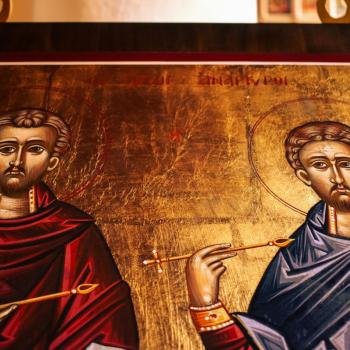The Gospel and Philosophy
John 1:1-14 and Matthew 2:1 – 11

istockphoto
The Feast Day of the Epiphany celebrates the revealing of Jesus to the Gentiles – the visit of the wise men. In Eastern tradition it is known as Theophany, also as Three Kings Day. In Louisiana, it marks the first day of serving King Cake. The cakes are filled with cream cheese and all other kinds of sweet fillings. First King Cake on the Epiphany; last King Cake on Fat Tuesday the day before Ash Wednesday. Welcome to the Feast.
This essay celebrates the partnership of the Gospel and philosophy and rhetoric. My texts are John 1:1 – 14 and Matthew 2:1 – 11. John and the wise men in my view, represent the philosophers of the Church. Last week I told Dr. Andrew King, a rhetorical colleague at LSU that John’s Gospel is the gospel for philosophers and rhetoricians. There’s nothing elitist in the remark. There are at least 5 books in the Bible that are the work of philosopher/rhetoricians: Job, Proverbs, Song of Solomon, Ecclesiastes, and John.
The church has a long, storied history with philosophers and rhetoricians. Our current populism, with its insistence on simplicity, emotion, and impulsivity, has taken control of many American pulpits. A church rooted in the philosophy of Plato and Aristotle and turned into a world religion with the preaching of highly educated scholars trained in rhetoric and philosophy has been reduced to Ted Talks.
I am calling attention to the reality of the intellectual firepower that energized the church for so many centuries and appealing for us to pay more attention to critical thinking and scholarship in the church. Young women and men, newly hooded with Ph.D.’s can make fantastic pastors in local churches. And local churches can remember our tradition and embrace the gifts of scholarship that God has provided.
John is so different from Matthew, Mark, and Luke. Matthew is laser focused on the church and Jesus as the New Moses. Mark seems to be in a hurry to run the race from Bethlehem to Jerusalem while Luke, our only Gentile NT writer, offers an inclusive gospel that shows the large role played by women. John is cosmic: “In beginning, the Word.” The New Adam. The New Creation. That’s why those three are grouped together and called the Synoptic Gospels. Then there’s John over here in the corner alone. Maybe he didn’t play well with others. John gives us a new creation for Christmas. John doesn’t start with a baby in a manger he starts before the dawn of time. John starts with a universe filled with stars and planets, teeming with life and possibility. John gives us the cosmic war between light and dark: The light shines in the darkness and the darkness can’t overcome it. John starts with LOGOS – the Word. This means that we are still participating in creation. The philosopher/theologian Aquinas said that creation was ongoing. I still think M.Div. students should be required to read Summa Theologica, all 2200 plus pages as a requirement for graduation.
Children’s literature has often addressed the difficulties of being different. Rudolph the Red-Nosed reindeer was so different that all the other reindeer made fun of him. Only special circumstances made Rudolph a necessity for saving Christmas. Well, John is not an odd sort with strange talents – not a flying elephant or red-nosed deer. John is smart, a really intelligent and profound scholar.
I believe John’s Gospel is a necessity in our secular age. The church, an army divided and in retreat, with its soldiers fighting one another, is in trouble. Evangelicals are so angry they have disregarded the wealth and wisdom of critical biblical scholarship and ignore the changes that a literal Bible can’t handle.
There are at least five ways that preachers can succeed.
1. You can make a spectacle of yourself with overdramatic performances.
2. You can become infamous by pouring out conspiracy theories from your pulpit, dispensing hatred for gays while swearing you love everyone, and espouse misinformation about a literal creation and a coming rapture.
3. You can be excellent but as comedian Chris Rock puts it, “This requires effort, hard work, practice.
4. You can be a marketing guru and join the church growth movement where the object is to fill vast auditoriums with thousands of people whether they believe in God or not.
5. You can throw yourself into the minutia of church machinery – the busy work of trying to meet all the expectations of a congregation. You can be so busy with busy work that you have about an hour on Saturday to throw together a sermon. But all that busy work doesn’t bring a word from the Lord. A microwave sermon doesn’t have the same nutrition of a five-course meal. I encourage my students to a life of reading and attention to scholarship. Start every morning when you are inspired by the challenge of your task and make sure you are inspired at six o’clock every morning, eager for another day for the pleasures of your craft. Three hours a day for reading, pondering, thinking, and writing and you will be amazed at how much material you will produce.
I recommend the 5th way: Excellence. Churches producing the echoes of a literal Bible and a populist simplicity will finally shrivel into the darkness. Now, the churches need women and men who area academically and intellectually prepared to be more like John the philosopher than Joel Osteen.













